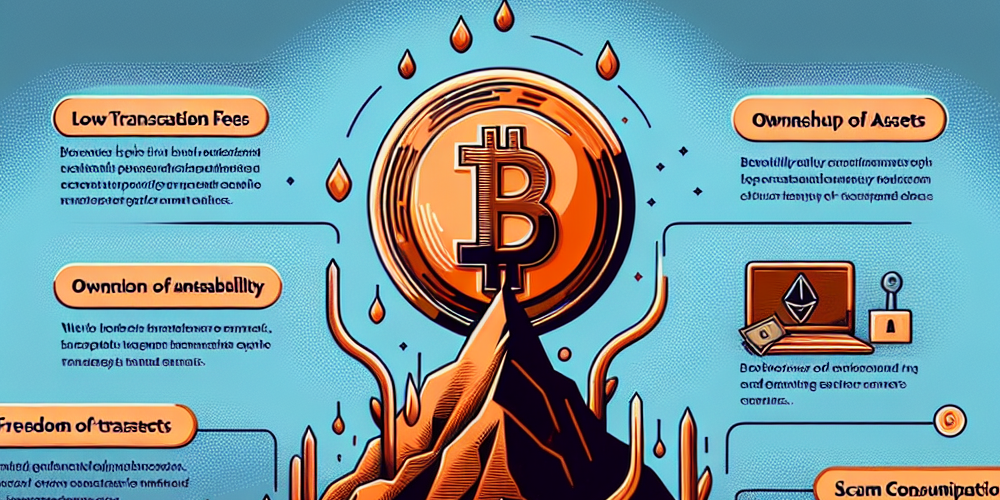With the growing popularity of digital assets in recent years, many people are getting into coin investing. In this article, we'll demystify coin investing for beginners, starting with the basic concepts of coin investing, and then breaking it down step-by-step, including preparation, how to choose a safe exchange, the account opening process, how to buy and store coins, and effective investment strategies and risk management. We'll also introduce you to useful information and resources to help you start investing in coins more safely and wisely.
With this article, you'll have a better understanding of the coin market and be able to take your first steps with confidence.
What is a coin?
Coins are a type of digital currency, based on blockchain technology to be transacted and stored securely. Investing in coins is one of the topics that has gotten a lot of attention lately. In this section, we'll take a look at what coins are and how they're used.
Definition of a coin
- A **digital asset**: A coin is an asset that exists electronically and has no physical form, unlike fiat currency.
- Using encryption technology**: Coins are traded in a secure form through encryption technology.
- Distributed ledger: A distributed ledger called a blockchain is used to record all transactions.
Types of coins
- Bitcoin (BTC): The most widely recognized coin, it was the first to be developed.
- Ethereum (ETH): A coin with smart contract capabilities, used for a variety of applications.
- Ripple (XRP): A coin designed for fast money transfers between financial institutions.
Use cases for coins
- Investing and trading**: Coins can be used as an investment vehicle, similar to stocks.
- Pay for goods and services: You can pay with coins at many online and offline stores.
- International money transfers: Send international money faster and cheaper than traditional methods.
As you can see, coins can be used for a variety of purposes, and many people are interested in investing in them because of their attractive features.
Things to do before you start investing in coins
Before you start investing in coins, it's important to make sure you have the right things in place. Once you've done your homework, you can proceed with confidence. Let's go over some important points below.
Thorough market research
Researching the relevant market is essential before investing in a coin.
- Market Trend Analysis: Analyze which coins are currently gaining traction and what the market trends are.
- Technical and fundamental analysis: We use technical analysis using technical indicators, as well as fundamental analysis such as the project's whitepaper to value the coin.
- Follow news and social media: Stay updated with the latest information from major news sites and social media.
Choose a secure exchange
Choosing an exchange to invest on is also very important.
- Trusted exchange: We recommend choosing a trusted and secure exchange, for example, Binance, Coinbase, and other popular exchanges.
- Check transaction fees: Choose an exchange with lower transaction fees to save on unnecessary costs.
- Customer support: Make sure the exchange has a customer support team that can respond quickly when issues arise.
Enhanced security
It's also important to strengthen the security of your exchange account and personal wallet.
- Two-factor authentication (2FA): Be sure to set up two-factor authentication to protect your account.
- Use a cold wallet: Store coins you want to hold for the long term in a cold wallet that is disconnected from the internet.
- Change your password regularly: Change your password regularly, and avoid using the same password for multiple services.
Once you've done this, you'll be better prepared to start investing in coins, and you'll be able to do so safely and effectively.
How to choose a safe exchange
Choosing a safe exchange is one of the most important steps in getting started investing in coins. In this section, we'll walk you through how to choose a safe and reliable exchange.
Check the security level of your exchange
- Two-Factor Authentication (2FA): Choose an exchange that offers two-factor authentication to increase the security of your account.
- Whether it uses cold wallets: Exchanges that use cold wallets to protect assets from hacking are safer.
- Security Incident History: We recommend avoiding exchanges that have had security incidents in the past.
The exchange's regulatory compliance
- Government-certified: Make sure the exchange is authorized by your country's financial authorities.
- KYC procedures: Exchanges that follow "know your customer" procedures are safe from illegal activity.
- AML policy: Make sure your anti-money laundering policies are strictly enforced.
User support and quality of service
- Customer support: Make sure you have a 24/7 customer support center that can respond quickly in an emergency.
- User Interface: We recommend exchanges that offer an intuitive and easy-to-use interface.
- Community Rating: You can judge the reliability of an exchange by looking at reviews and ratings from other users.
With these tips in mind, we hope you'll have a successful first step into coin investing by choosing a safe and reliable exchange.
Guide to opening and verifying an account
Before you can start investing in coins, you'll need to open an account and go through the verification process, which is simple but must be followed correctly to ensure safe and smooth trading. Let's take a closer look at the account opening and verification process below.
How to open an account
- Select an exchange: Choose a trusted cryptocurrency exchange. Popular exchanges include Ubit, Bithumb, and Coinone.
- Sign up: Sign up for membership through the homepage or mobile app of the exchange of your choice. You'll need to set up an email address and password, and agree to the terms and conditions.
- Protect your account: Set up two-factor authentication (2FA) to further secure your account. This is typically set up using a Google Authenticator app or similar.
Authentication process
- Enter your personal information: Enter basic information such as your name, date of birth, and contact information.
- Submit ID: Submit a national ID or driver's license to verify your identity. Some exchanges also accept passports.
- Initial verification completed: Initial verification is completed with the submitted ID, which can take up to a day.
Additional authentication and security settings
- Address verification: Submit a utility bill or bank statement to verify your residency.
- Bank account linking: Link your bank account to deposit and withdraw funds. This provides additional security and is required by most exchanges.
- Increased transaction limits: After completing all of the above verification steps, you can increase your transaction limits for high value transactions through a separate vetting process.
This process will allow you to start investing in coins in a safe and reliable trading environment. Please make sure you follow the requirements at each step exactly to avoid unnecessary delays.
How to buy and store coins
To get started investing in coins, it's important to understand how to buy and store them. In this section, we'll explain the process of buying coins and how to store them safely.
Understanding how to buy coins
- Choose an exchange: Choosing a reliable exchange is the first step. Some popular exchanges include Ubit, Bithumb, and Korbit,
You can decide based on user reviews and security.
- Sign up and verify your identity: After signing up for a membership on the exchange of your choice, you will need to verify your identity. During this process, you will be asked to use the
You may be asked to verify your cell phone, verify your email, or provide ID.
- Account linking: You will need to link your bank account with the exchange in order to deposit cash. This is done to verify your name and to ensure that the
This is a required step for transferring funds.
- Buying coins: After depositing cash into your account, you can purchase the coins of your choice with KRW or USD. There are two order types: market orders and
There are limit orders, which you should choose based on your personal investment strategy.
How to store coins and what to do
- Hot and cold wallets**: There are two ways to store your coins: hot wallets and cold wallets. Hot wallets are
Internet-connected wallets are convenient to use, but can be hacked. Cold wallets are wallets that are disconnected from the internet and are more secure.
- Manage your wallet address: Each coin is given a unique wallet address. Wallet addresses are very long and complex, so you need to manage them accurately.
If you send it to the wrong address, it will be hard to find.
- Keep your private key: When you create a wallet, you are issued a private key. This is the only key to access your coins, so you should never share it with anyone.
and should be kept in a safe place.
Additional security measures
- Enable Two-Factor Authentication: Enhance security by enabling Two-Factor Authentication for your exchange account and wallet. This means that you can use the
This is a great help in defending against hacking attempts.
- Backup and recovery codes: Keep your backup and recovery codes safe in case you lose your wallet. Write them down on a piece of paper or use a secure
We recommend storing it in a digital environment.
- Password management: Set strong passwords and change them regularly. Using the same password in multiple places is a violation of the
We recommend avoiding them.
For a better coin investing experience, make it a habit to choose carefully and keep them safe.
Investment strategy and risk management
Understanding investment strategy and risk management is crucial for successful coin investing. To make it easier for beginners to get started, we'll introduce you to effective investment strategies and thorough risk management methods.
Setting investment goals
The first step to an effective investment strategy is to set clear investment goals.
Your investment goals can be divided into short-term, medium-term, and long-term, and you need to create an appropriate strategy accordingly.
- Short-term goals: Aiming to make a quick profit, you can invest in coins with higher volatility than stocks or other financial instruments.
- **Mid- to long-term goals**: Believing in the growth potential of the market, aiming for long-term returns, and choosing a relatively stable coin is recommended.
Diversification
One important strategy for managing risk is diversification. By investing in a variety of coins, you can reduce the risk of price fluctuations in any one coin.
- Diversify your investments across Bitcoin, Ethereum, and various altcoins to flexibly respond to market changes.
- Portfolio Management: Regularly check your portfolio and rebalance as needed to keep it in optimal shape.
Stop Loss and Take Profit
It's important to plan your stop-loss and take-profit strategies in advance to minimize the risk of investing in coins.
- Set a stop-loss: Set a range that you are willing to accept as a loss of a percentage of your investment, and automatically execute a sell within that range.
- Take Profit: Set a target rate of return in advance and sell some or all of your coins when that rate is reached to take a locked-in profit.
With clear investment goals, diversification, stop-loss and take-profit strategies, and more, even beginners can safely start investing in coins.
Useful information and resources about coins
If you're new to coins, we'll provide information and resources to help you get started. In this section, we'll cover everything from the basics of investing in coins to practical tips on how to use them.
Understanding the basic concepts of coins
A coin is a digital asset, a cryptocurrency based on blockchain technology, which allows for secure and transparent transactions.
- Blockchain: A decentralized data storage technology where transaction history is distributed and stored across multiple nodes.
- Mining: The process of validating transactions and adding new blocks to a blockchain network.
- Wallet**: An electronic wallet to securely store your coins; there are software wallets and hardware wallets.
Useful online resources
Here are some websites and resources for investing in coins.
- CoinMarketCap: Get real-time prices, market capitalization, trading volume, and more for a wide range of coins.
- CoinDesk: A global source for the latest cryptocurrency news and analysis.
- TradingView: Provides charting tools and a variety of indicators for technical analysis.
Investment strategy and management tips
Efficient coin investing requires a strategic approach.
- Diversify your portfolio: It's important to diversify your investments across different types of coins to reduce risk.
- Analyze market trends: You should regularly monitor price movements and trading volumes to stay on top of market trends.
- Set a stop loss: Set a specific loss limit, and when it reaches that level, sell aggressively to prevent further losses.
With these tips, even beginners will be able to start investing in coins more safely and efficiently.








-e1721301964228-150x150.png)


